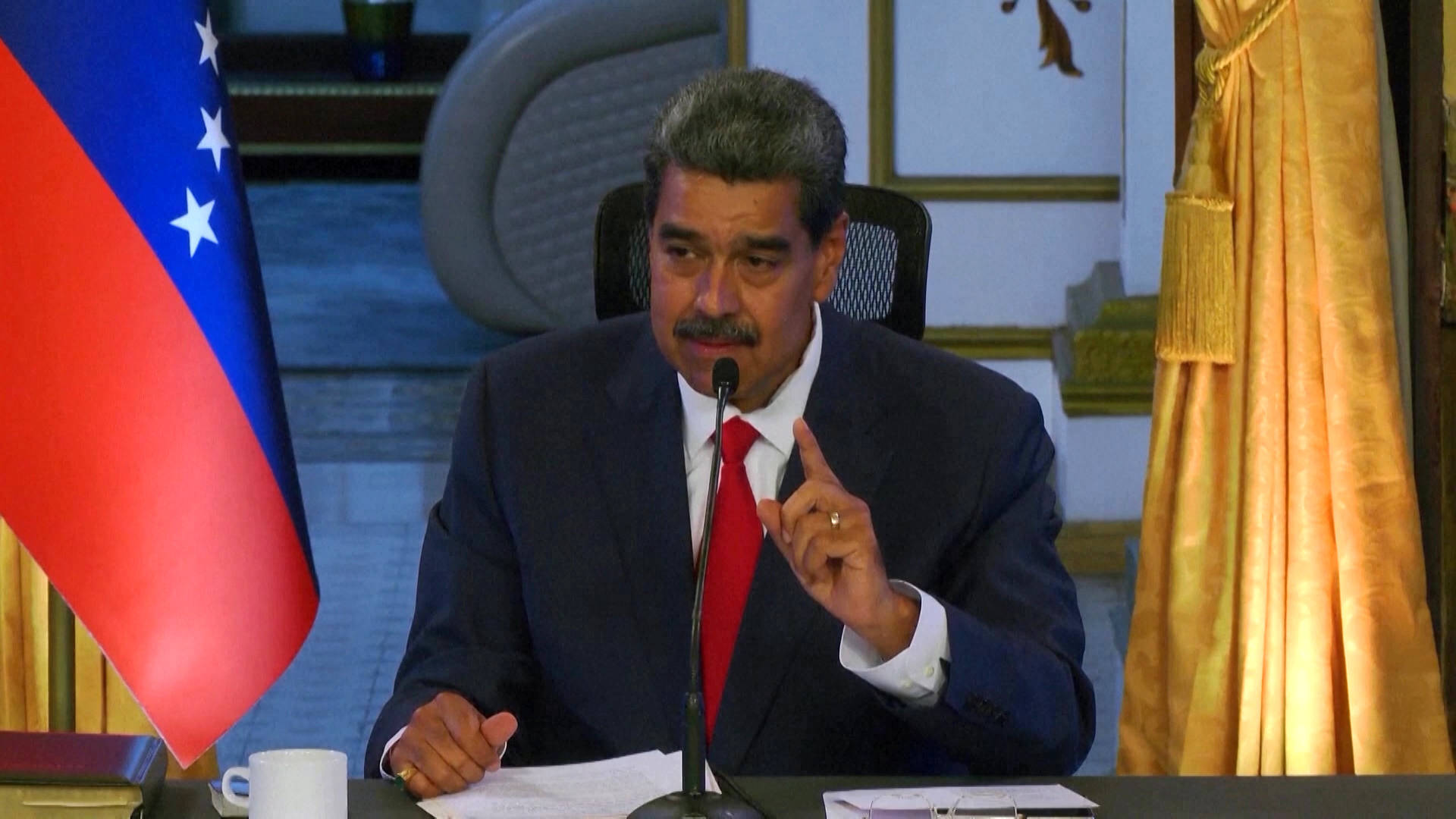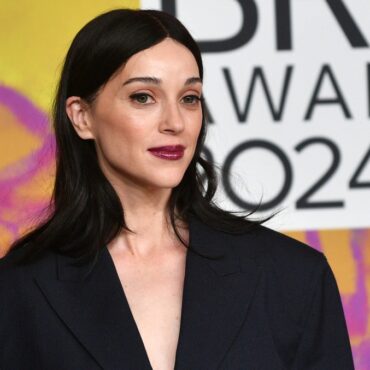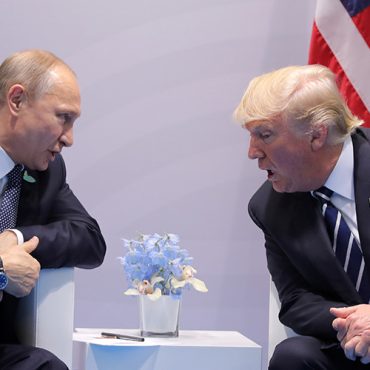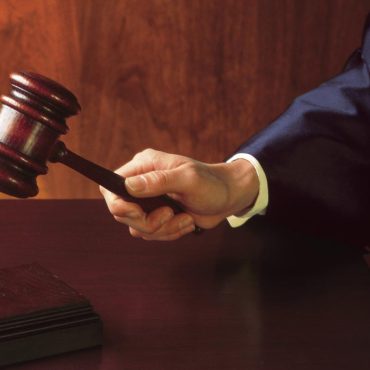This is a rush transcript. Copy may not be in its final form.
AMY GOODMAN: This is Democracy Now!, democracynow.org, The War and Peace Report. I’m Amy Goodman.
We turn now to Venezuela, where tension is rising over the contested results of the presidential election that took place just over a week ago. The incumbent president, Nicolás Maduro, who was declared the winner by Venezuela’s National Electoral Council, has vowed to “pulverize” the U.S.-backed opposition, which has released thousands of vote tally sheets to back its claims that opposition candidate Edmundo González received more than twice as many votes as Maduro. Countries including the U.S., Argentina, Uruguay, Costa Rica and Ecuador have recognized González as Venezuela’s president-elect. But others have questioned the authenticity of the opposition’s tally sheets, which González and fellow opposition leader María Corina Machado said they secured from polling centers nationwide.
Dueling protests continued in Caracas and other cities this weekend both in support of Maduro and against him. Rights groups have denounced the crackdown on opposition protests, with Human Rights Watch estimating at least 20 people have been killed by Venezuelan Armed Forces. Maduro spoke from Caracas Saturday.
PRESIDENT NICOLÁS MADURO: [translated] We have 2,000 prisoners captured. From there, they go to Tocorón and Tocuyito prisons, maximum punishment, justice. This time, there will be no forgiveness. This time, there will be Tocorón prison.
AMY GOODMAN: On Friday, Mexican President Andrés Manuel López Obrador criticized the Biden administration for recognizing Venezuelan opposition candidate Edmundo González as president-elect.
PRESIDENT ANDRÉS MANUEL LÓPEZ OBRADOR: [translated] We make a respectful appeal to all governments to ensure that there is no interventionism. No government is authorized. It is not legal. It is not legitimate to issue a ruling giving victory or loss to a candidate from another country. What is that? There is no world government.
AMY GOODMAN: This all comes as the U.N. Refugee Agency estimates more than 7.7 million people have been forced to leave Venezuela since 2014, as sanctions imposed by the United States and European Union have devastated Venezuela’s economy.
For more, we’re joined by two guests. In Caracas, Edgardo Lander is with us. He is a sociologist, where he is part of the Citizen’s Platform in Defense of the Constitution, part of a Latin American network of activists and academics called Ecosocial and Intercultural Pact of the South. And in Albany, New York, we’re joined by Nina Farnia, a legal historian at Albany Law School. She’s the co-founder of the International People’s Tribunal on U.S. Imperialism and Sanctions. She just returned from Caracas, where she volunteered with the National Lawyers Guild as an election observer.
We welcome you both to Democracy Now! Let’s begin in Caracas. Edgardo Lander, if you can explain what you think took place?
EDGARDO LANDER: Good morning, Amy. Thanks for the invitation and the opportunity to talk to you and your audience.
There is no doubt that Maduro was overwhelmingly defeated by this elections. The electoral system in Venezuela, it’s — the technical part of the system is probably one of the best in the world. There’s hardly any possibility of interference with the results at the technical level. But there are many mechanisms incorporated into the system, including paper ballots, that are printed, and acts that are registered and signed by the witnesses at each voting booth that can be compared with the results presented by the totals of the Electoral Council.
All the steps that secure the system that are checks established in the system were completely thrown out by the Electoral Council. They published a made-up data, so-called final results. They declared Maduro president before they had even finished counting. There were more than — almost 3 million votes that hadn’t been counted by the time they declared.
And it is a fact that the witnesses at the voting booths have copies of what actually happened at each voting booth. And it’s clear that these papers show that there was an overwhelming result. I directly know of several centers in — that had been radically Chavistas up to some short time ago where the results were against the government. This is really representative also of a tendency where even the most Chavista centers in the country voted against Maduro. So there’s no doubt that Maduro lost this elections.
Maduro has now decided to ask the Supreme Court to check the whole process again in order to figure out what’s going on.
AMY GOODMAN: So, let’s go to Nina Farnia.
EDGARDO LANDER: It’s very clear that this is — this caused —
AMY GOODMAN: Edgardo, we’re going to get comment from Nina Farnia, legal historian at Albany Law School. You’re just back from Venezuela. You were an observer with the National Lawyers Guild. If you can talk about what you saw, and respond to Edgardo Lander?
NINA FARNIA: Well, thank you for having me on, Amy.
What we witnessed, by and large, was a free and fair election process, which explains why former President Jimmy Carter once called this system the best electoral system in the world. We were part of a large international delegation of election monitors that included members of the African Union and the Latin American election experts, and we were quarantined with the rest of our delegation in a hotel that was separate from all the political activities. We attended days of trainings about the Venezuelan electoral system, about the laws that protect it, and then we were taken — prior to the elections, we were taken to polling stations around the country, where we saw the touchscreen voting machines. We saw the ballot boxes for the paper ballots. We met the directors of each voting center.
On the day of the election, our NLG delegation had the privilege of interviewing voters as they were going in and out of the voting room, and we also interviewed members of each of the parties that were there to monitor the elections, the polling stations. We also interviewed opposition voters. We didn’t hear any concerns from any voters or observers. Every single person that we spoke with said that this is a free and fair process. They had faith in the system. And, in fact, what we saw was a ton of energy around each of the stations that we visited. People were proud to vote. They take that — they view voting as a pillar of the Venezuelan democracy and of the Bolivarian Revolution.
AMY GOODMAN: And your sense of what had happened before? The polls showed that González had won or was going to win by a landslide. Ultimately, what the Electoral Council announced was that — and, of course, we all know that polls can be very wrong — was that Maduro had won by 51%, Nina.
NINA FARNIA: Yes. So, exit polling is illegal in Venezuela, because it can — it has the effect of altering votes. And also, a lot of the polling results that were used in the U.S. media, the polling predictions that were used in the U.S. media were discredited by Venezuelanalysis, a trusted news source in Venezuela, that has also been critical of the Maduro government.
We actually are very concerned by the claim that González has won. González was a diplomat in — a Venezuelan diplomat in El Salvador during the Salvadoran death squads. He was number two stationed there. He has blood on his hands. He has Salvadoran blood on his hands. And so, the idea that the Venezuelans would support a government, a president who executed U.S. foreign policy in El Salvador decades ago is shocking to us. It’s up, ultimately, to the Supreme Court to decide.
AMY GOODMAN: So, Edgardo Lander, you have said it’s clear that Maduro lost. You are a leading left voice in Venezuela and, globally, one of the early leaders of the World Social Forum. Even in the United States, when they were demanding that the ballots be shown the following morning, they are not available, for example, in the United States, what happens, right after an election. In what way were these opposition shown ballots verified by anyone but the opposition? And what do you say, Edgardo Lander, to those fellow leftists who say this is a result of a longtime U.S. campaign to unseat Maduro, to destabilize his government with crushing sanctions?
EDGARDO LANDER: In the first place, the demand to have public access to the ballots is not some weird demand that somebody made up. It’s part of the controls that are established in Venezuelan laws. According to Venezuelan laws, the Electoral Council has to publicly present the ballots at each voting center. And it has absolutely denied to do so. So it’s absolutely clear that they had presented a total result with no backing whatsoever, so the backing that’s expected and established by the law is completely absent.
The ballots that are in the hands of the González people are not the only ballots that are available, because different candidates and their witnesses get copies of the ballots at the voting centers. And all the ballots that are in the hands of this several other candidates show the same tendencies. They show the tendencies that there was an overwhelming majority of people voting against Maduro.
I think that this is a test for the left internationally. If the left in many places of the world, in Latin America, in the United States, Europe, some sectors of the left, continue to call the Venezuelan government as a revolutionary leftist government, if this repressive, authoritarian, corrupt, extractivist government that is destroying the environment, and it’s in constant violation of human rights, is defined as left, if this is what’s presented as the offer for the future of humanity, then it’s clear that this left is contributing to increasing the appeal of the right wing and the far right wing. This has ceased to be a leftist government a long time ago.
The conflict in Venezuela has not been in this election a conflict between left and right. It’s a conflict between a repressive government and a whole spread of positions in Venezuelan society that go from far right to left, that includes social democrats, that includes progressives, that includes liberals. It includes a whole spread of people who want to recover democracy, who want to recover the Constitution in Venezuela, which is completely violated by this increasingly authoritarian government. If this result is imposed on the Venezuelan society, this could be the nail on the coffin that will be the end result of these authoritarian tendencies that have been going on for quite some time and establish a truly authoritarian government.
So it’s very important for the left in Venezuela to get as much solidarity from the left internationally in the recognition that this is not a U.S. conspiracy, that it’s not fascism. We reject U.S. intervention. The United States has no right to decide who won the elections. This is an issue for Venezuelans to decide. And the United States has been intervening in Venezuela for a long time. Sanctions have had a dramatic impact on Venezuelan society. The humanitarian crisis and almost 8 million people that have left the country because they see no future are basically the result of U.S. intervention and U.S. sanctions. So, it’s not in any way a support for U.S. position. We, from the left, reject U.S. intervention and insist on the fact that it’s not for the United States to decide who won the election.
But in Venezuela, according to the ballots that are in the hands of the citizens, it’s quite clear that there is a violation of the electoral laws. If the basic mechanism established in the Electoral Council for guaranteeing that the results are free — that the elections are free is the comparison between the printed ballots and the signed documents at each voting booth, with the totals presented by the Electoral Council, this is the main of several mechanisms to guarantee that the elections really reflect — the results reflect the will of the people. If the government refuses to show their results and just makes up some random numbers, there’s no way then the Venezuelan society can trust what the results are. It’s obvious that the government denies the possibility of doing what the law requires it to do, which is to present each voting booth result.
AMY GOODMAN: Nina Farnia, we gave —
EDGARDO LANDER: It refuses to do so. It’s very —
AMY GOODMAN: We gave Edgardo Lander the first word. We give you the last.
NINA FARNIA: First of all, I want to correct Professor Lander. The Venezuelan government, according to the laws that we learned about while we were there, has 30 days to release the tallies from the day of the election. We’re not even 10 days yet. Second of all, it’s not up to the international left to decide who the president of Venezuela is. It’s up to the Venezuelan people. And it’s difficult for me to trust somebody who is known to have met with the widely discredited figure Juan Guaidó, about what the Venezuelan left should or shouldn’t do, or whether or not the Maduro government is a leftist government.
The Venezuelan people, it looks like, based on our perceptions of the process, of the election process, chose President Maduro. But to the extent that there’s disagreement about what actually happened, the Supreme Court should be allowed to decide, not Secretary of State Blinken, who came out last week saying Venezuela needs to transition away from socialism, or anybody else. It’s up to the Venezuelan people.
Venezuela has been subject to hybrid warfare, which includes election tampering, severe sanctions, targeted assassinations. Just this morning, a democratic official was assassinated. The Venezuelan people have the right to challenge U.S. interference and U.S. imperialism, and they get to decide who their president is, not the international left, not Secretary of State Blinken, no one else.
AMY GOODMAN: We want to thank you both so much for being with us, and, of course, we’re going to continue to follow this issue in Venezuela. Nina Farnia is a legal historian at Albany Law School. She volunteered with the National Lawyers Guild as an election observer in Venezuela. And we want to thank Edgardo Lander. Edgardo Lander is a sociologist in Caracas, Venezuela.











Post comments (0)